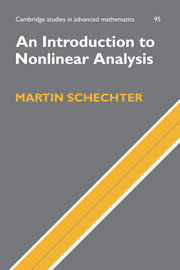Book contents
- Frontmatter
- Contents
- Preface
- 1 Extrema
- 2 Critical points
- 3 Boundary value problems
- 4 Saddle points
- 5 Calculus of variations
- 6 Degree theory
- 7 Conditional extrema
- 8 Mini-max methods
- 9 Jumping nonlinearities
- 10 Higher dimensions
- Appendix A Concepts from functional analysis
- Appendix B Measure and integration
- Appendix C Metric spaces
- Appendix D Pseudo-gradients
- Bibliography
- Index
Appendix D - Pseudo-gradients
Published online by Cambridge University Press: 04 August 2010
- Frontmatter
- Contents
- Preface
- 1 Extrema
- 2 Critical points
- 3 Boundary value problems
- 4 Saddle points
- 5 Calculus of variations
- 6 Degree theory
- 7 Conditional extrema
- 8 Mini-max methods
- 9 Jumping nonlinearities
- 10 Higher dimensions
- Appendix A Concepts from functional analysis
- Appendix B Measure and integration
- Appendix C Metric spaces
- Appendix D Pseudo-gradients
- Bibliography
- Index
Summary
The benefits
If you recall in Chapter 2, we introduced the concept of a pseudogradient. This was done in order to solve differential equations in which the right-hand side was not Lipschitz continuous. These equations came about when we tried to show that if the gradient of a C1 function did not vanish, we could decrease the function. But the equations we wanted to use involved the gradient of the function, which was only known to be continuous and not Lipschitz continuous. Our approach was to substitute another function for the gradient which (a) was Lipschitz continuous and (b) allowed one to decrease the function when the gradient does not vanish. This was done by approximating the gradient by a smoother function. In ℝ2 we used the Heine–Borel theorem to cover bounded sets by a finite number of small balls, construct a Lipschitz continuous function in each ball and then piece them together by means of a partition of unity.
However, in an infinite dimensional Hilbert space this approach does not seem to work. We do not have any difficulty constructing a Lipschitz continuous approximation in a ball or a finite number of balls. But we need to cover the space (or portion of the space) with balls that are locally finite (i.e., any small neighborhood intersects only a finite number of them). This is where the rub is. Can this be done in an arbitrary Hilbert space?
- Type
- Chapter
- Information
- An Introduction to Nonlinear Analysis , pp. 345 - 352Publisher: Cambridge University PressPrint publication year: 2005



